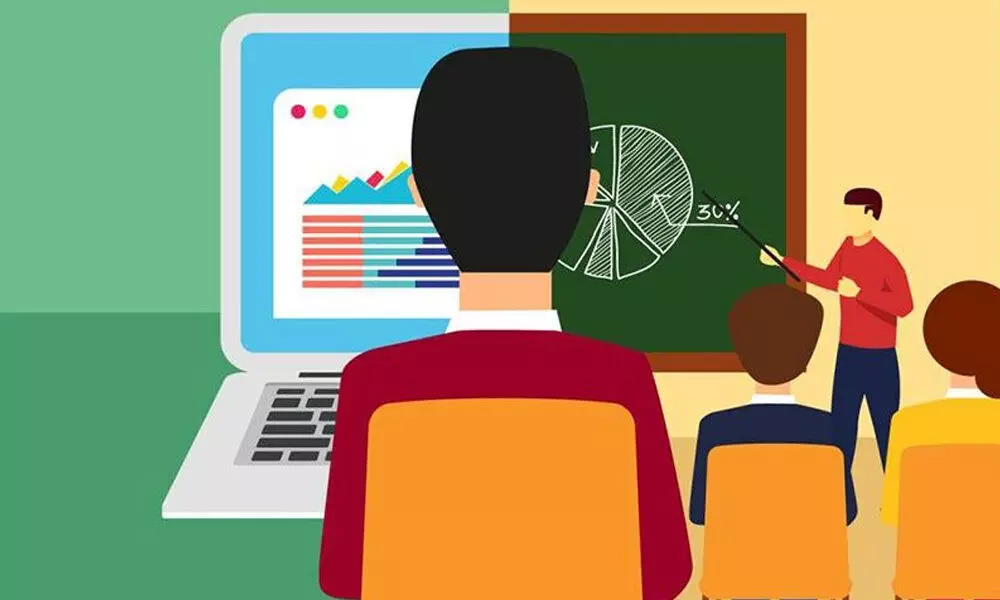Live
- Nizamabad MP Dharmapuri Arvind and Jagtial MLA Dr. Sanjay Kumar Meet CM Revanth Reddy
- Hyderabad CP CV Anand Issues Stern Warning to Bouncers
- MP Laxman Criticizes Police Conduct, Calls for Support for Victims' Families
- Fire Breaks Out in Kachiguda-Chennai Egmore Express, Passengers Evacuated Safely
- CM Revanth Reddy Condemns Attacks on Film Personalities' Homes, Calls for Strict Action
- Victory Venkatesh and Nandamuri Balakrishna to Set Screens on Fire with Unstoppable Season 4
- Over 71.81 crore Ayushman Bharat Health Account numbers generated: Centre
- In special gesture, Kuwait's Prime Minister sees-off PM Modi at airport after conclusion of historic visit
- Veer crowned PGTI Ranking champion, Shaurya wins emerging player honour
- Sr National Badminton: Unseeded Rounak Chauhan, Adarshini Shri reach singles semis
Just In
Bridging gap between online, offline learning


Bridging gap between online, offline learning
The process of learning and teaching - anything, a new skill, value, attitude or knowledge - has been ever-changing and facing a continuous upgrade since time immemorial.
The process of learning and teaching - anything, a new skill, value, attitude or knowledge - has been ever-changing and facing a continuous upgrade since time immemorial. Over the years, the learning landscape has undergone several substantial revolutions - from the way children absorb concepts to how classes or curricula are designed.
For instance, the aspect of learning didn't remain uninfluenced when technology penetrated all spheres of our daily life at the threshold of the 21st century. In fact, as technology grew by leaps and bounds, it left its footprint in several facets of the learning process - thereby giving rise to the phenomenon of online learning.
The gap between online learning & offline learning
Initially, while teachers and educators were the sources of knowledge and all that there was to learn, the arrival of the internet came with an abundance of information that was available online.
With the option of online learning in the picture, children can manage to acquire knowledge and skills at their own pace and from the comfort of their own homes, leading to questions such as - Is technology replacing conventional classrooms with computers? Will we see online and offline learning processes complementing each other? And the latest hot debate of online learning vs offline learning.
Although online learning has its perks, technology has not yet been optimised for every aspect of the learning process; meanwhile, one cannot claim that online learning trumps offline or vice versa. Furthermore, while online learning, at best, can act as an enabler rather than a stand-alone proposition for education, the offline, teacher-centric way of learning has its own limitations - with either the teacher's word being final on the subject of them spoon feeding the children rather than guiding them while maintaining learner autonomy.
Herein lies a gaping void between online learning and offline learning environments - children do not get a chance to practically explore and wholly experience the subject matter they are supposed to be learning. And the fact of the matter is that a child's experience tends to define the success or failure of the learning process.
Play-acting is an embedded behaviour in children. Children tend to imitate and model an adult's actions without prior instructions or directions, just by keenly observing them. It is a powerful tool that encourages children to become active participants in their own learning process. Through experiential activities, children can gain rich experiences about the inner workings of diverse industries and professions as well as reinforce decision-making skills, personal skills, communication skills and good values. Engaging children in both life and learning, this type of pedagogical approach enhances a child's social and emotional growth, motor skills and cognitive development.
Experiential learning tends to strike a perfect balance between the theory of online/offline education and the practical application of acquired knowledge. Not only that, but it also gives brands a chance to foster learning among children by taking the route of experiential marketing. Through experiential marketing, brands have the golden opportunity to responsibly communicate with their target audience, bolstering the trust between themselves and their potential consumers. Furthermore, by collaborating with edtech companies and edutainment centres, brands can contribute to making the learning process for children engaging, meaningful and long-lasting, all while positively impacting the society at large.
Alongside that, another vital advantage of experiential learning is that it empowers parents with a way to cut down on their child's screen time. Ever since technology has made an advent in the realm of learning, children are seen to be constantly surrounded by screens. And offline, experiential learning with a smatter of entertainment is proving to be a successful solution to unplug children from their bright screens.
By tweaking the learning activities and making them fun and interactive for children, parents and educators can ignite the spark of curiosity within their child's mind, thereby driving them to take learning into their own hands and explore the world - thus growing up to become its responsible citizens.
- (The author is a Marketing Director at KidZania India)

© 2024 Hyderabad Media House Limited/The Hans India. All rights reserved. Powered by hocalwire.com






